#RPA Automation
Explore tagged Tumblr posts
Text
Unlocking Efficiency and Innovation: The Role of Robotic Process Automation (RPA)
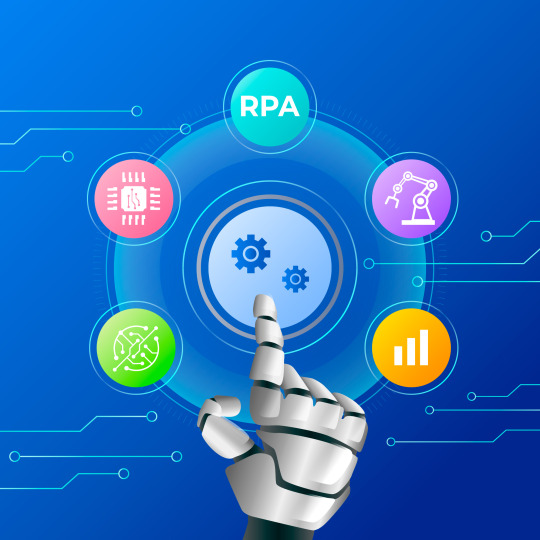
In today's fast-paced and competitive business environment, organizations are constantly seeking ways to improve efficiency, reduce costs, and increase productivity. Robotic Process Automation (RPA) has emerged as a powerful tool that can help businesses achieve these objectives.
What is Robotic Process Automation (RPA)?
Robotic Process Automation (RPA) is a technology that allows businesses to automate repetitive, rule-based tasks. It uses software robots, also known as "bots," to mimic human actions and interact with digital systems. These bots can log into applications, navigate through screens, input data, and complete tasks just like humans would.
The Role of RPA in Business:
RPA can be used to automate a wide range of tasks across various industries and departments. Here are some examples:
Finance and Accounting: Automating tasks such as accounts payable and receivable, invoice processing, and financial reporting.
Customer Service: Automating tasks such as answering FAQs, resolving customer inquiries, and processing orders.
Human Resources: Automating tasks such as onboarding new employees, processing payroll, and managing benefits.
IT: Automating tasks such as provisioning accounts, managing user access, and deploying software updates.
Impact of RPA on Businesses:
Implementing RPA can offer numerous benefits to businesses, including:
Increased efficiency and productivity: RPA can automate time-consuming and tedious tasks, freeing up employees to focus on more strategic and value-added activities.
Reduced costs: RPA can help businesses save money on labor costs, as well as reduce errors and compliance risks.
Improved accuracy and compliance: RPA bots are programmed to follow specific rules and procedures, which can help to improve accuracy and compliance with regulations.
Enhanced process visibility and control: RPA provides businesses with a clear view of their processes, which can help them identify and address bottlenecks.
Improved customer satisfaction: RPA can help businesses improve customer satisfaction by automating tasks such as order processing and customer service interactions.
RPA Services:
Implementing RPA successfully requires a partner with expertise in the technology and a deep understanding of business processes. A comprehensive RPA solution should include the following services:
Document AS-IS Process: This involves mapping out the existing process to identify areas for automation.
Design & Development of Bots, workflows, and forms for process automation: This includes designing and developing the software robots that will automate the tasks.
Bot license (We will use the appropriate underlying technology): This provides access to the software robots and the underlying technology platform.
Infrastructure: This includes setting up the necessary infrastructure to support the Robotic Process Automation (RPA) solution.
Production Deployment of the Bots: This involves deploying the bots to production and monitoring their performance.
RPA support: This includes ongoing support for the RPA solution, such as troubleshooting and maintenance.
Test & Deploy bots to production: This involves testing the bots in a production environment and making any necessary adjustments before they are deployed to full production.
Configuration data changes: This involves making changes to the configuration data of the bots as needed.
Password updates: This involves updating the passwords of the bots as needed.
Errors in executing the Bots: This involves resolving errors that occur during the execution of the bots.
Determining the “root cause” of a recurring issue or incident & recommendations: This involves identifying the root cause of a recurring issue or incident and recommending solutions to prevent it from happening again.
Infrastructure/application related issues: This involves resolving issues with the infrastructure or applications that the bots are interacting with.
Conclusion:
RPA is a powerful technology that can have a significant impact on businesses of all sizes. By automating repetitive tasks, RPA can help businesses improve efficiency, reduce costs, and increase productivity. However, it is important to choose a reputable Robotic Process Automation (RPA) companies with the expertise and experience to help you implement a successful RPA solution.
Ready to embrace the power of RPA?
Contact us today to learn more about how RPA can help your business achieve its goals.
#robotic process automation#robotic process automation rpa#rpa automation#robotic process automation software#rpa software#robotic process automation companies#robotic process automation technology#robotic process automation in healthcare#robotic process automation in banking#rpa solution#robotic process automation for finance#process automation solution#robotic process automation services#robotic process automation for insurance#rpa system#what is rpa automation#robotic process automation solution#robotic process automation benefits#robotic process automation consulting#robotic process automation consultant#rpa service provider#rpa consulting services
2 notes
·
View notes
Text
Future-Proof Your Business: RPA & Automation Solutions for Success
Robotic Process Automation (RPA) has become a pivotal technology for businesses aiming to enhance operational efficiency, reduce costs, and improve accuracy. At Spearhead Technology, we specialize in delivering comprehensive RPA and automation solutions that drive digital transformation across various industries.
Understanding RPA and Its Impact
RPA involves the use of software robots to automate repetitive, rule-based tasks traditionally performed by humans. By mimicking human interactions with digital systems, RPA streamlines processes, minimizes errors, and accelerates task completion. This automation leads to significant improvements in productivity and operational excellence.
Our RPA Solutions and Services
At Spearhead Technology, we offer a suite of RPA services designed to cater to diverse business needs:
Process Discovery & Optimization: We assist businesses in identifying automation opportunities by analyzing existing workflows and optimizing them for RPA implementation. This ensures that automation efforts are aligned with organizational goals, leading to enhanced efficiency and effectiveness.
RPA Implementation: Our team guides organizations through the seamless deployment of RPA solutions, ensuring minimal disruption to existing operations. We focus on automating tasks that offer the highest return on investment, enabling businesses to reap the benefits of automation swiftly.
Intelligent Automation: By integrating AI with RPA, we enable businesses to automate complex processes that involve unstructured data and decision-making, further enhancing operational capabilities and adaptability.
Compliance & Governance: Our solutions ensure that automated processes adhere to regulatory standards, providing robust audit trails and reducing the risk of non-compliance. This is particularly crucial in sectors with stringent regulatory requirements.
The Spearhead Technology Advantage
Partnering with Spearhead Technology for your RPA needs offers several distinct advantages:
Expertise and Experience: Our team comprises professionals with deep expertise in RPA technologies and industry-specific knowledge, ensuring that solutions are tailored to your unique challenges and objectives.
End-to-End Support: From initial process assessment to post-implementation support, we provide comprehensive assistance throughout the RPA journey, ensuring sustained value and continuous improvement.
Scalability and Flexibility: Our RPA solutions are designed to scale with your business, adapting to changing needs and supporting growth initiatives without significant additional investments.
Industries We Serve
We have successfully implemented RPA solutions across various sectors, including:
Banking and Financial Services: Automating processes such as account reconciliation, payment processing, and compliance reporting to enhance accuracy and speed.
Healthcare: Streamlining patient data management, billing, and claims processing to improve patient care and operational efficiency.
Manufacturing: Optimizing supply chain management, inventory control, and production scheduling to boost productivity and reduce costs.
Retail: Enhancing customer service operations, inventory management, and order processing to deliver superior customer experiences.
Getting Started with RPA
Embarking on the RPA journey involves several key steps:
Identify Automation Opportunities: Assess business processes to pinpoint tasks that are repetitive, rule-based, and high in volume, making them ideal candidates for automation.
Select the Right RPA Tool: Choose an RPA platform that aligns with your organization's technical environment and scalability requirements. Leading tools like UiPath, Automation Anywhere, and Blue Prism offer diverse features to suit various needs.
Develop a Pilot Project: Initiate automation with a pilot project to demonstrate value, address potential challenges, and refine strategies before scaling.
Engage and Train Your Team: Involve employees in the automation process, providing training and addressing concerns to ensure smooth adoption and maximize benefits.
Monitor and Optimize: Continuously evaluate the performance of automated processes, making necessary adjustments to optimize efficiency and effectiveness.
Conclusion
Integrating RPA into your business operations can lead to transformative improvements in efficiency, accuracy, and scalability. At Spearhead Technology, we are committed to guiding you through every stage of the automation journey, delivering solutions that align with your strategic objectives and drive measurable results.
0 notes
Text
How Automation Is Supporting 5G Rollouts and Improved Network Management
The arrival of 5G technology has undoubtedly launched the telecom industry into a new era of higher speeds, better connectivity, and innovations.
0 notes
Text
RPA automation strategies: Why RPA is essential for business growth in 2025
The world strives for digital transformation, with increased new technology to assist them with the process. Robotics plays a vital role in their transformation by enabling companies to streamline workflows, reduce human error, and achieve cost-effective operations. This blog focuses on robotics process automation and how businesses can scale themselves with this technology.
What is Robotics process automation (RPA)?
RPA means the use of bots to automate repetitive tasks. RPA’s automation anywhere services make this possible. The possibility of removing human error enables companies to streamline their businesses and allows employees to focus on value-added activities. RPA automation of tasks includes data entry, processing transactions, managing inquiries, and integrating multiple systems.
By 2025, the robotics market is said to reach 20 billion dollars. Adopting this technology will not only become a tool to eliminate mundane tasks but will also be used to enhance user experience. Companies adopting this technology will reduce costs and increase effectiveness and efficiency, driving the company's growth. According to a recent survey, 84% of Indian organizations will achieve an enterprise-wide RPA deployment or scale up existing RPA initiatives by 2025.

The Growing demand for RPA automation services
Automation became necessary for companies to become agile. The demand is driven by the need to analyze big data, external pressure from competitors, and meeting deadlines. Automation enables your business to:
Boost Productivity: RPA can work around the clock without needing rest or breaks, increasing throughput and enabling companies to do more tasks in less time.
Minimize Human Error: Automated systems guarantee that procedures are followed precisely and consistently, eliminating the possibility of human error that can result in expensive blunders.
Boost Compliance: RPA helps organizations lower non-compliance risk by ensuring that tasks are carried out strictly by rules and guidelines.
Reduce Operational Expenses: Automating repetitive work can help businesses reinvest savings into growth areas by cutting labor expenses and operational inefficiencies by a large margin.
With the growing demand for RPA automation, simply adopting the technology isn’t enough. One must scale automation strategically to remain competitive in 2025 and beyond.
Why You Need to Scale Up Your Business
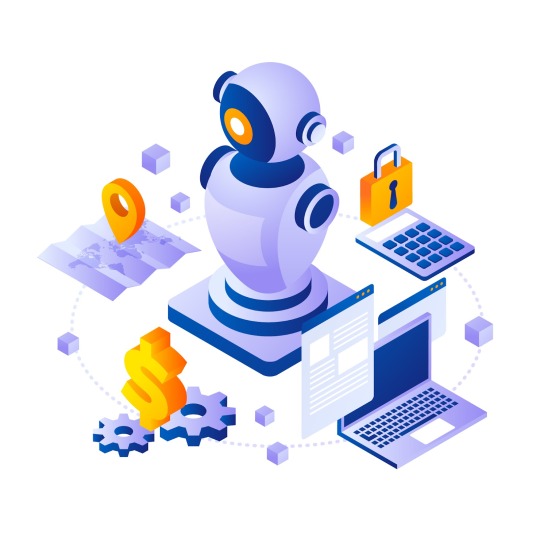
Scaling is a vital factor that the company must consider for the organization's growth. Scaling involves expanding the company without compromising efficiency while meeting the demand requirements. In today's world, scaling is essential for development and survival. Here's why scaling is necessary for your business:
Customer experience: As the business grows, the number of customers also increases, making it challenging to meet customer demands. Scaling allows companies to manage customer experience by providing faster responses, analyzing customers' data, and predicting customer demands, essential to improving customer satisfaction and gaining a competitive advantage.
Seizing new market opportunities: A company that scales effectively gains a strategic advantage when entering new markets or releasing new products or services.
Reducing operational bottlenecks: Manual procedures may develop bottlenecks as a company grows, restricting efficiency and growth. Automation—primarily through RPA—is essential to increasing because it lessens the need for human labor for repetitive operations, enabling companies to expand without interruption.
Preserving Cost-Efficiency: Growing only sometimes entails spending more money. Businesses can grow without adding staff or resources in proportion by utilizing automation techniques like RPA. This guarantees profitability and sustainability in the long run.
Competing in the digital economy: Businesses that don't adapt to the rapid advancement of technology risk slipping behind their rivals. Expanding corporate activities, mainly via automation, enables businesses to maintain flexibility and effortlessly adjust to evolving market circumstances.
By integrating RPA into the scaling process, businesses can accomplish these objectives while controlling their operating expenses and enhancing customer experiences. Companies may automate processes and meet rising demand using RPA's scalable solution, eliminating the need for significant increases in human resources.
Level Up Your RPA Game in 2025: Top 5 RPA Scaling Strategies
Scaling without a strategy and effectively managing resources will strive from the path that the organization is taking. Here are some of the essential tactics for growing automation:
High-Impact Areas First:
Companies that want to scale up should start by concentrating on the areas where automation will have the biggest effects. These are frequently labor-intensive, highly repetitious, and error-prone operations. Examples include customer service (answering questions), IT assistance (resetting passwords), and finance and accounting (processing payroll, for example).
By automating high-impact areas initially, businesses may achieve rapid wins, gain traction, and show stakeholders the value of RPA.
Invest in the right technology:
Selecting an appropriate RPA platform is essential for growth. Businesses should search for RPA solutions that provide flexibility, scalability, and interoperability with current systems. Platforms for RPA hosted in the cloud are beneficial since they offer the scalability and flexibility required to accommodate extensive automation projects.
Furthermore, companies ought to consider combining RPA with other cutting-edge technologies like machine learning (ML) and artificial intelligence (AI). This combination—often referred to as intelligent automation—allows bots to perform more complicated activities, like data processing and decision-making, which can further improve RPA's capabilities.
Build an automation center:
A specialized group called an Automation Center of Excellence (CoE) manages RPA initiatives, directs continuous development, and supervises the organization's automation strategy. The CoE can serve as a focal point for RPA expertise, help standardize procedures, and guarantee that best practices are followed.
Additionally, the CoE is essential in establishing an automation culture throughout the company, aligning automation initiatives with corporate objectives and guaranteeing the successful scaling of RPA projects.
Employee Upskilling and Reskilling:
When repetitive jobs are automated, workers may concentrate on higher-value duties like creativity, problem-solving, and client interaction. To ensure they can succeed in an automated environment, the personnel must be retrained and upskilled in light of this change.
Employers ought to fund training initiatives that educate staff members on collaborating with robots, using RPA automation technologies, and taking on new responsibilities requiring a higher degree of creativity and critical thinking.
Establish governance protocols:
Scaling RPA requires effective governance. Businesses should establish clear procedures for bot administration and instructions for bot deployment, upkeep, and performance tracking. In addition, security needs to be given high attention, with safeguards in place to secure private information and guarantee adherence to industry rules.
By establishing a governance framework, organizations can ensure that automation is safe, scalable, and in accordance with goals.
RPA service provider:
Partner with a company like Infosprint Technologies, a leading digital transformation company, to Leverage the expertise of industrial professionals to get consultation on RPA services.
Utilize their insights into RPA to identify the right automation modules, understand new technologies, and gain a competitive advantage by knowing the RPA trends.
Headwinds Ahead: Scaling RPA in a Complex World
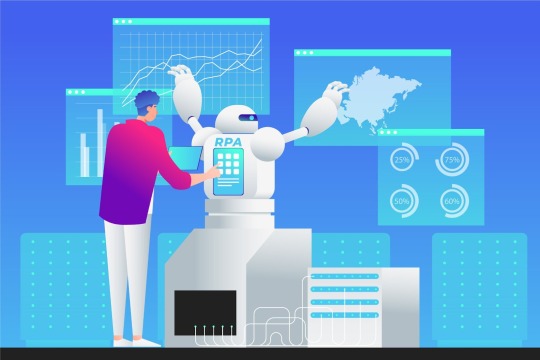
Process selection:
Not all automation processes are suitable for companies' modules, so selecting and prioritizing the appropriate automation module is a hurdle. All companies must make the process selection. While RPA might suit rule-based and repetitive tasks, not all businesses share the same structure.
For example, RPA is unsuitable for companies focusing on human judgment while generating invoices; customer responses are ideal for RPA scaling.
Technical complexity:
Integrating with current IT systems is a common step in scaling RPA, and it can be difficult and time-consuming. Implementing RPA at scale can be challenging due to incompatible data formats, diverse applications, and legacy systems.
Organizations must also address data security and compliance concerns and ensure robots can safely and seamlessly interface with various systems. Investing in a robust IT infrastructure and qualified technical personnel is necessary.
Organization change management:
RPA has the potential to drastically alter the workplace, especially for workers whose jobs could be affected by automation. Organizations must address concerns about job displacement and be ready for possible opposition to change.
Sufficient change management is necessary to guarantee that workers support automation efforts. This entails openly discussing the advantages of RPA, offering chances for training and reskilling, and emphasizing how automation can enhance human labor rather than replace it.
Governance and maintenance:
The importance of governance increases with the scale of RPA initiatives. Oversight is necessary to manage several bots, ensure they perform as planned, and uphold security procedures. Without adequate oversight, businesses could experience bot failures, inefficiencies, or security flaws.
In addition, bots need constant upkeep to continue working properly. Changes in IT systems or business processes can disrupt automated workflows, so businesses must ensure that bots are updated frequently to stay up to speed with changing procedures.
Staying competitive on the edge of automation
RPA is a strategic enabler that will reshape corporate operations in the future, not just a technical instrument. Businesses that have effectively scaled automation will be better positioned by 2025 to cut expenses, enhance customer satisfaction, and maintain competitiveness in an increasingly digital marketplace.
However, increasing RPA requires thorough preparation, financial support for technology, and a human-centered approach. In the era of robotic process automation (RPA), companies that embrace automation, make the appropriate technological investments, and cultivate a continuous improvement culture will prosper.
The question still stands: Will you fall behind in the race to digital transformation, or are you scaling automation to stay competitive as the speed of change quickens? Acting now is imperative, and RPA holds the key to unleashing your company's full potential in the years to come.
#robotic process automation#rpa automation services#rpa automation#rpa scalable solution#digital transformation company#rpa trends
0 notes
Text
Attended vs Unattended RPA- How to Choose the Right Automation Solution
0 notes
Text
Rpa Solution Providers Dubai
techcarrot RPA Solution Providers in Dubai offer a range of services to help organizations streamline their operations, reduce costs, and improve accuracy. We also provide consulting, implementation, and support services to ensure successful RPA deployments.
#rpa service providers#rpa development company#rpa solutions#rpa software#rpa services#rpa automation#digital transformation
0 notes
Text
RPA Expert

Get ahead in the automation revolution with our team of RPA Expert. Whether you're exploring RPA for the first time or seeking to optimize existing solutions, our experienced professionals provide comprehensive RPA consulting, implementation, and support services, ensuring your success in the digital era.
0 notes
Text
Robotic Process Automation In Healthcare | RPA Consulting Services | NuAIg NuAig is the best RPA consulting service provider that delivers bespoke robotic process automation solutions in the healthcare and senior living industry. They have a team of experts who implement RPA automation for aged care providers and healthcare firms. Check out the RPA use cases to know more about process automation using robotics technology. To book a demo mail at [email protected] call +1 732 328 8205
#robotic process automation in healthcare#robotic process automation#rpa automation#digital process automation#rpa solutions#robotic process automation services#rpa in healthcare#rpa consulting#rpa implementation#rpa use cases#robotic process automation solutions#rpa consulting services#rpa service provider#rpa advisors for senior living#rpa application for senior living#rpa for caregiver onboarding#rpa services for senior living
0 notes
Text
rpa in retail in India
a
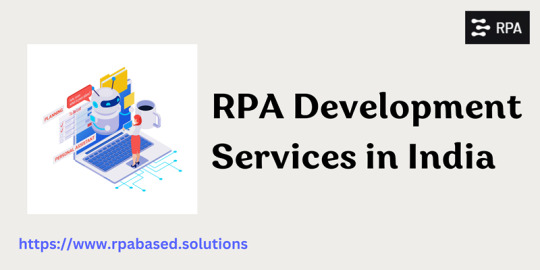
Revolutionizing the Retail Industry with RPA - Unveiling RPA Based Solutions in india
Introduction: In the ever-evolving world of retail, staying ahead of the competition requires embracing cutting-edge technologies. Robotic Process Automation (RPA) has emerged as a transformative force, streamlining retail operations and elevating customer experiences. RPA Based Solutions, a pioneering provider of RPA solutions, is at the forefront of empowering the retail sector with automation. In this blog post, we delve into the game-changing use cases of RPA in retail and explore the myriad benefits that RPA solutions bring to the retail landscape.
Understanding RPA in Retail: Robotic Process Automation (RPA) involves deploying intelligent software robots to automate repetitive and rule-based tasks, mimicking human actions with speed and precision. In the retail industry, RPA is revolutionizing various aspects, from supply chain management to customer service.
Use Case of RPA in Retail:
Inventory Management: RPA can automate inventory management tasks, such as monitoring stock levels, generating purchase orders, and updating inventory databases in real-time. By streamlining inventory processes, RPA ensures optimal stock levels, reducing stockouts, and overstocking.
Order Processing: RPA excels in automating order processing tasks, including order placement, payment processing, and order fulfillment. This reduces order processing time, minimizes errors, and enhances customer satisfaction with timely deliveries.
Price Monitoring and Competitor Analysis: RPA can efficiently collect and analyze pricing data from competitors, enabling retailers to make informed pricing decisions. This competitive advantage allows retailers to offer competitive prices and stay ahead in the market.
Benefits of RPA Solutions in Retail:
Enhanced Operational Efficiency: RPA automates time-consuming tasks, enabling retail staff to focus on strategic initiatives and customer-centric activities, ultimately enhancing overall operational efficiency.
Improved Customer Service: By automating order processing and inventory management, RPA accelerates delivery times and minimizes errors, leading to improved customer service and satisfaction.
Cost Optimization: RPA reduces labor costs associated with manual tasks, enabling retailers to optimize resources and allocate them to more value-added activities.
Accurate Data Management: RPA ensures accurate and real-time data management, facilitating data-driven decision-making and enhancing overall business intelligence.
Adaptability to Scalability: RPA solutions can scale to meet the dynamic needs of the retail industry, accommodating seasonal fluctuations and changing demands.
Conclusion: RPA Based Solutions is leading the charge in leveraging the power of RPA to revolutionize the retail industry. With RPA in retail, businesses can achieve enhanced operational efficiency, superior customer service, and cost optimization. From automating inventory management to streamlining order processing, RPA transforms retail processes, empowering businesses to stay competitive in a rapidly changing market. Partner with RPA Based Solutions to embark on a transformative journey in the world of retail and experience the true potential of Robotic Process Automation in elevating your retail business to new heights of success.
#RPA in retail#rpa automation#rpa development company#rpa#rpa solutions#rpa software#rpa based solution#inida#dubai#uae#usa
1 note
·
View note
Text

Future-proof your accounting firm with the powerful combination of AI and RPA! These technologies enhance efficiency, accuracy, and compliance, allowing your firm to focus on strategic insights and growth. Is your firm ready to implement AI and RPA? Explore how Unison Globus can help you navigate the future of accounting automation today! Visit: https://unisonglobus.com/choosing-between-ai-and-rpa-what-us-cpas-and-accounting-firms-need-to-know/
#AI vs RPA in accounting#unison globus#Accounting automation#AI in accounting#RPA in accounting#Benefits of AI for CPAs#Benefits of RPA for accounting firms#AI and RPA integration#Accounting technology trends#RPA for invoicing
1 note
·
View note
Text
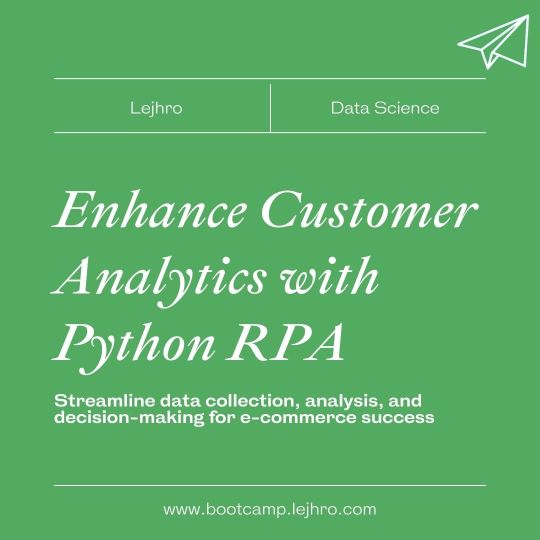
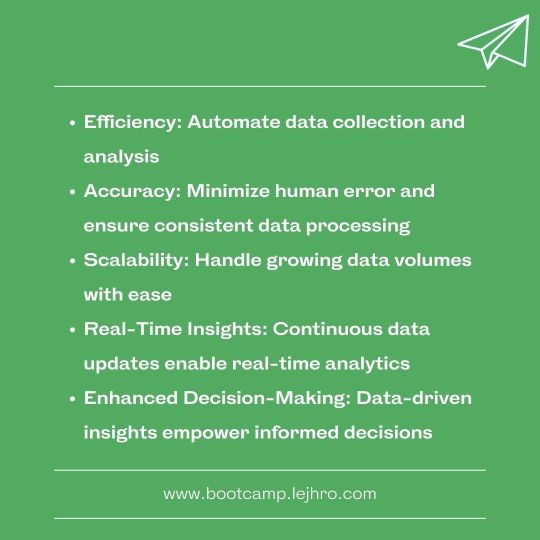
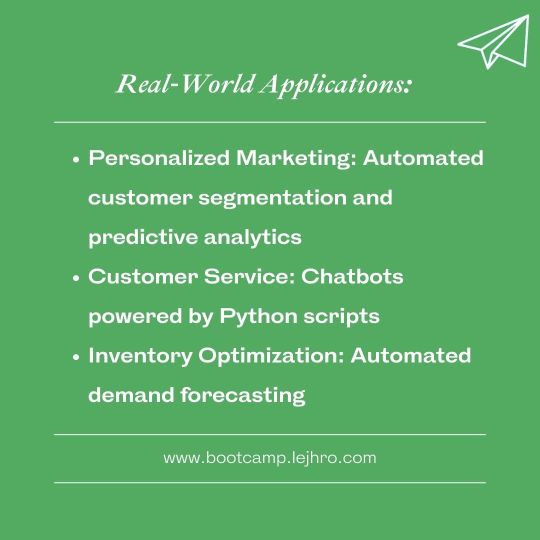

🚀 Boost Your E-commerce Game with Python RPA! 🚀
Enhance customer analytics with Python-based Robotic Process Automation (RPA) and stay ahead of the competition!
💥 Efficiency, accuracy, and scalability - what more could you ask for? 🤔
💥Learn More: www.bootcamp.lejhro.com/resources/python/improving-customer-analytics-in-e-commerce
💥The latest scoop, straight to your mailbox : http://surl.li/omuvuv
#Lejhro#LejhroBootcamp#Ecommerce#Python#RPA#CustomerAnalytics#BusinessGrowth#DigitalTransformation#DataScience#ArtificialIntelligence#MachineLearning#Automation#TechTrends#Innovation#MarketingTips#Ebusiness
2 notes
·
View notes
Text
Elevating Efficiency: AI-RPA Synergy!

The integration of Artificial Intelligence (AI) and Robotic Process Automation (RPA) has catalyzed a transformative shift in the landscape of business automation, leading to the emergence of Intelligent Automation (IA). As organizations increasingly seek innovative solutions to streamline operations, enhance efficiency, and deliver superior customer experiences, the synergy between AI and RPA has become instrumental in achieving these objectives. By combining the cognitive capabilities of AI with the rule-based automation of RPA, IA offers a powerful framework for automating complex processes, optimizing decision-making, and driving digital transformation across industries. This integration empowers businesses to leverage advanced technologies to augment human capabilities, unlock new levels of productivity, and foster a culture of continuous improvement.
Explore how AI and RPA can work together here!
2 notes
·
View notes
Text
The Top Choice: Oracle Enterprise Resource Planning Cloud Service for Your Business Success
Are you searching for the best solution to streamline your business operations? Look no further than the Top Choice: Oracle Enterprise Resource Planning (ERP) Cloud Service. In today's fast-paced business world, organizations need a robust ERP solution to optimize their processes, enhance productivity, and drive growth. Oracle ERP Cloud Service, crowned as the best in the industry, offers a comprehensive suite of tools designed to meet the demands of modern businesses.
Why Choose the Best: Oracle Enterprise Resource Planning Cloud Service?
Oracle ERP Cloud Service stands out as the Best Option for businesses across various industries. Here's why:
Scalability: Easily scale your ERP system as your business grows, always ensuring seamless operations.
Integration: Integrate ERP with other Oracle Cloud services for a unified business platform.
Real-time Insights: Gain valuable insights into your business with real-time analytics, enabling data-driven decision-making.
Security: Rest easy knowing your data is secure with Oracle's advanced security features.
Frequently Asked Questions about the Best Choice: Oracle ERP Cloud Service
Q1: What modules are included in Oracle ERP Cloud Service?
A1: Oracle ERP Cloud Service includes modules for financial management, procurement, project management, supply chain management, and more. Each module is designed to optimize specific aspects of your business.
Q2: Is Oracle ERP Cloud Service suitable for small businesses?
A2: Yes, Oracle ERP Cloud Service is scalable and can be tailored to meet the needs of small, medium, and large businesses. It offers flexible solutions suitable for businesses of all sizes.
Q3: How does Oracle ERP Cloud Service enhance collaboration among teams?
A3: Oracle ERP Cloud Service provides collaborative tools that enable teams to work together seamlessly. Features like shared calendars, document management, and task tracking enhance communication and collaboration.
Conclusion: Empower Your Business with the Best ERP Solution
Oracle Enterprise Resource Planning Cloud Service is not just a choice; it's the Ultimate Solution for businesses seeking to optimize their operations. By harnessing the power of Oracle ERP, you can streamline processes, improve efficiency, and drive innovation. Don't let outdated systems hold your business back. Embrace the future with Oracle ERP Cloud Service and propel your business to new heights.
Ready to transform your business? Contact us today to explore the endless possibilities with the best ERP solution on the market.
#oracle#oracle erp#rapidflow#oracle erp cloud service#best erp solution#oracle erp service providers#business#business automation#oracle services#enterprise software#scalability#integration#rpa#market#erp
3 notes
·
View notes
Text
Streamline Manufacturing Processes with RPA – Unlock Efficiency & Compliance
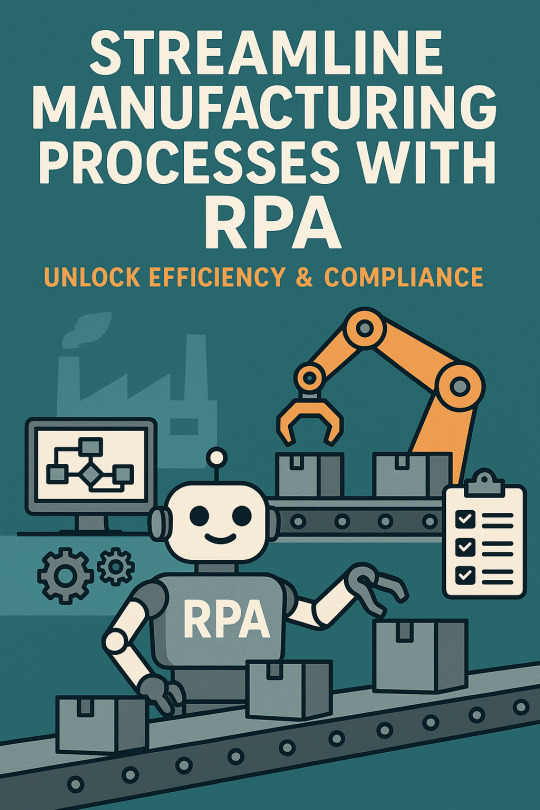
Robotic Process Automation (RPA) is revolutionizing the manufacturing industry by automating time-consuming back-office tasks, improving compliance, and boosting operational efficiency. From invoice processing and BOM automation to logistics and compliance management, RPA helps manufacturers cut costs and eliminate errors. ESS India offers tailored RPA solutions that seamlessly integrate with your existing systems—reducing downtime, enhancing throughput, and enabling real-time process visibility. Ready to digitally transform your manufacturing operations? Discover top RPA use cases in manufacturing and how your business can benefit today.
0 notes
Text
🚀 Power Automate vs Azure Logic Apps – Which one to choose? Explore this in-depth comparison covering features, licensing, use cases, pros/cons, security, and more. A must-read for automation enthusiasts and IT decision-makers! #PowerAutomate #AzureLogicApps #Microsoft365 #Automation #LowCode #Azure
#Azure Integration#Azure Logic Apps#Cloud Automation#Enterprise Automation#Logic Apps vs Power Automate#Low Code#Microsoft 365#Power Automate#RPA#Workflow Automation
0 notes
Text
Efficiency and Excellence with techcarrot’s RPA Services
techcarrot, with headquarters in Dubai and operations in multiple countries across the world, is a trusted partner in helping business achieve automation-driven excellence. We provide RPA services that redefine the way you do business.
Why choose techcarrot for RPA?
Streamlined Operations: techcarrot's RPA solutions are designed to streamline your operations by automating repetitive, rule-based tasks. This means you can redirect your workforce to focus on tasks that require creativity, problem-solving, and strategic thinking.
Enhanced Accuracy: Robots don't make human errors. With our RPA services, you can expect a remarkable increase in accuracy across various business processes. From data entry to complex calculations, our bots ensure flawless execution.
Cost Savings: By automating routine tasks operational costs can be significantly reduced. RPA works without interruption 24/7, ensuring that your business runs efficiently without incurring additional labor expenses.
Rapid Scalability: As your business grows, so does the demand for streamlined processes. Our RPA solutions are highly scalable, meaning they can adapt to the evolving needs of your organization without disrupting your current operations.
Data Security: In today’s digital age data security is very important. Our RPA services are designed with state-of-the-art security protocols to ensure that your sensitive data is protected at all times.
Customized Solutions: We recognize that no two businesses are exactly the same. That's why techcarrot offers tailor-made RPA solutions to meet your specific needs. Our team of experts works closely with you to identify bottlenecks and opportunities, ensuring that your automation strategy aligns with your unique goals.
Seamless Integration: Implementing RPA doesn't mean you need to overhaul your existing systems. Our solutions seamlessly integrate with your current software, ensuring a hassle-free transition.
Track Record of techcarrot
techcarrot has a proven track record of transforming businesses across various industries. Our RPA services have helped companies in finance, healthcare, logistics, and more, achieve remarkable results. From faster processing times to reduced errors and cost savings, our clients consistently experience the benefits of RPA integration.
Join the RPA Revolution with techcarrot
Embrace the future of business operations with techcarrot's RPA service provider in Dubai, Middle East. Leave the routine, repetitive tasks to our bots, and let your team focus on what they do best. Experience increased efficiency, reduced costs, and enhanced precision – all with the power of Robotic Process Automation Company Dubai, Middle East & Globally.
Contact us today to learn more about how techcarrot can revolutionize your business with RPA. Together, we will unlock new levels of efficiency and excellence, paving the way for your organization's success in the digital age.
#rpa services#rpa service providers#rpa development company#rpa development services#rpa solutions#rpa software#rpa automation#Robotic Process Automation Company Dubai
0 notes